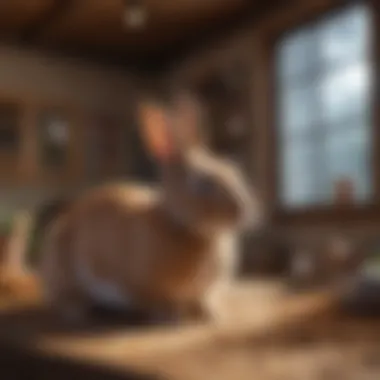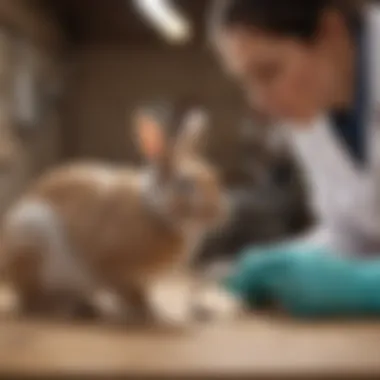Navigating the Complexities of Rabbit Care


Intro
Caring for a pet rabbit involves more than just providing food and shelter. There are several intricacies that every rabbit owner, whether experienced or a beginner, must understand. This article takes a pragmatic approach to unveil the challenges and demands inherent in pet rabbit care. Key issues such as housing, nutrition, socialization, and health care will be scrutinized, providing an insightful perspective into what it really means to own a rabbit.
Housing Requirements
Proper housing is crucial for a rabbit’s well-being. Rabbits need enough space for exploration and play. A hutch or an enclosure should be spacious and safe, allowing the rabbit to move around freely. It’s also important to consider temperature control. Rabbits are sensitive to extreme heat or cold, which can drastically affect their health.
Furthermore, litter box training is a priority for many owners. Providing a clean, private area will not only promote hygiene but also encourage more natural behavior. Owners must also remember that rabbits are inherently curious; safe toys should always be available to prevent boredom.
Nutrition Basics
Nutrition plays a foundational role in the health of any pet rabbit. A suitable diet primarily includes hay, fresh fruits, and vegetables. Commercial rabbit pellets can supplement this, but quality should be observed. One common myth is that rabbits can consume plenty of carrots;, however, high sugar content means they should only be offered sparingly.
In offering fresh greens, it's wise to fill in variety to ensure the rabbit receives the proper vitamins, minerals, and nutrients. Dehydration is another overlooked aspect, so fresh water should always be accessible.
Socialization Challenges
Rabbits are social creatures, necessitating regular interaction, not only with humans but also potentially other rabbits. Introduction of a second rabbit should be addressed carefully to avoid territorial disputes. Failure to manage this can result in stress and behavioral issues, both of which will have a negative impact on health.
Key to building trust is patience. An animal perceives its owner as a part of its tribe, so gradually interacting without invading personal space will foster a sense of comfort.
Health Care Essentials
Rabbits face specific health risks, making regular check-ups vital. A rabbit owner must know common health issues, such as dental problems and gastrointestinal stasis. Early detection is imperative as these problems can develop into serious issues if not monitored closely.
Owners should also establish contacts with avian vet as most standard family veterinary offices may lack adequate knowledge in rabbit care. Regular veterinary check-ups are recommended to prevent potential health problems.
Evaluating Rabbit Care
Acknowledging the above aspects is a testament toarabbit care commitment. Each rabbit is an individual with unique needs necessitating thoughtful maintenance. Raising a rabbit demands effort and dedication, over the superficial act of simply having an adorable pet.
Understanding the complexities of pet care transforms a casual ownership into a respectful and knowledgeable partnership.
In summary, educating yourself on these challenges will foster a more enriching relationship between you and your rabbit, enhancing both your lives through informed and conscientious care promptly followed by proactive and observant owners.
Preamble to Rabbit Care
Understanding how to properly care for rabbits is crucial for anyone considering these animals as pets. Though often seen as low-maintenance, rabbits have unique needs that must be met to ensure their happiness and health. This section of the article will delve into the important aspects of rabbit care, highlighting their basic requirements and addressing the misconceptions surrounding their maintenance.
Key points include:
- Importance of accommodating the rabbit's behavioral and health care needs.
- Fostering deep understanding on veterinary care and socialization.
- Discovering the nuanced commitment involved in providing optimal care for rabbits.
Every potential rabbit owner must recognize these factors before deciding to welcome a rabbit into their lives. Making an informed decision early on ensures a more successful and enriching relationship between the owner and pet.
Why Consider a Rabbit as a Pet
Rabbits possess a charm that appeals to many pet owners. Their gentle nature and playful demeanor are endearing qualities. Unlike many pets, rabbits are clean animals, often taking care of their grooming needs. Numerous owners appreciate their quiet surroundings. They can be litter trained, which is an enticing trait for potential pet owners.
Moreover, rabbits require less daily exercise than dogs, making them suitable for apartment living. Their diet is also relatively straightforward, relying mainly on hay, pellets, and fresh vegetables as staple foods. For families with children, rabbits can be good companions if introduced correctly and supervised.
However, consider the following before adopting:
- Assessing your home environment suitability.
- Analyzing your ability to commit time and attention to your new pet.
- Taking into account possible prolonged lifespan of up to ten years.
In essence, while rabbits can enhance your life with their companionship, one must ensure they can meet the various responsibilities involved in their care.
Understanding the Commitment Required


Owning a rabbit is a lasting commitment that goes well beyond the initial stages. New owners must be aware of both the time and effort required to provide a conducive living environment and proper care.
Rabbits thrive on interaction and stimulation. Hence, they require dedicated social time. A key element of your commitment includes providing mental and physical engagement, such as supervised playtime and safe toys. Rabbits possess active minds and need to exercise their instincts through exploration and interaction with their environment.
In addition to daily engagement, regular veterinary visits are necessary for both preventive health care and urgent issues that may arise. This level of consistent care is vital to ensure your rabbit remains healthy over time. Long-term financial planning is another aspect owners need to consider. Annual costs can accumulate, covering food, supplies, regular check-ups, and emergency medical care.
Basic Needs of Rabbits
Taking care of a rabbit fulfills various needs that are essential for their well-being. This section discusses the fundamental requirements that should not be overlooked when bringing a rabbit into a home. Understanding these essential needs is the foundation for successful rabbit care. The main aspects include housing requirements, nutrition, and routine maintenance. Each of these points is critical to ensuring your rabbit lives a healthy and happy life.
Housing Requirements
Size Considerations
Size considerations refer to the space that rabbits need to live comfortably. A common requirement is that a rabbit should have enough space to hop freely. Ideally, a habitat should be substantial; if raised indoors, the cage should measure at least 5 times the size of the rabbit lying down. This means giving them room for exercise as well. Proper size helps prevent boredom and encourages movement. Rabbits that do not have access to adequately sized spaces may experience health problems over time.
Shelter Types
Shelter types play a significant role in the security and comfort of your rabbit. There are various types including hutch styles, free-range setups in the backyard, or even indoor rabbit enclosures. Each has strengths and weaknesses. For a hutch, it offers protection from predators. A free-range setup allows for free movement but requires secure fencing. When considering shelter, it is necessary to think about safety and protection from the elements. Ensuring high-quality shelter is a vital aspect of maintaining healthy rabbits.
Indoor vs.
Outdoor Housing
The decision between indoor and outdoor housing is important. Indoor housing provides safety from predators and often better protection against extreme weather. Conversely, outdoor housing offers a more natural environment but requires detailed care. Elements like grooming for the outdoor rabbit often become more significant. Indoor housing may lead to a stronger bond with the owner due to constant exposure. Placing the rabbit type in the right environment is vital to its well-being.
Nutritional Needs
Essential Diet Components
Essential diet components are fundamental to rabbit happiness and longevity. Critical elements include hay, fresh vegetables, and pellets made specifically for rabbits. These items together ensure balanced nutrition and are meant to flutter their sensitive digestive systems. An optimal diet helps in proper gut function and prevents common issues like obesity or gastrointestinal problems. Misunderstanding or neglecting these essential components can lead to health issues.
Common Dietary Mistakes
Common dietary mistakes often arise from pet owners giving rabbits incorrect food. Many people underestimate the importance of restricting fruit intake. Too many sugary items can harm a rabbit's digestive system considerably. Also, neglecting to offer hay can influence their dental health negatively. As misunderstandings play a crucial role in dietary choices, awareness here is essential. Examining these pitfalls serves as a guide for correct feeding practices.
Treats and Supplements
Treats and supplements can enhance a rabbit's diet but should be provided with caution. The key factor is moderation. Small amounts of herbs or vegetable treats play a role as protein sources, crucial for growth phases in younger rabbits. However, adding too many additional supplements can disturb an established balanced diet. Assessing these bits of nutrition added into their main meals results in a shiny coat and bright disposition while avoiding risks that arise from overindulging.
Routine Maintenance
Cage Cleaning Procedures
Cage cleaning procedures are integral to the well-being of each rabbit. Keeping their living space clean prevents odors and reduces the risk of diseases. A weekly thorough clean should occur. This means replacing bedding, washing surfaces, and resetting toys. Regular maintenance fosters an environment suitable for the rabbit’s health and enables happier behaviors, like exploring. Proactively improving these standards leads to considerable benefits in health management.
Grooming Requirements
Grooming requirements depend on the rabbit’s breed. Long-haired varieties usually need more attention compared to short-haired ones. During shedding seasons, regular brushing helps keep hairballs at bay. Also, nails should be routinely trimmed to prevent discomfort. Establishing an appropriate grooming routine aids in bonding while ensuring that fur remains clean. This becomes essential in averting hygiene problems, proving that grooming enhances overall rabbit health.
Health Check Frequency
Health check frequency assists in keeping rabbits in optimal state. Regular vets visits count significantly to tackle hidden health concerns. A general recommendation is to have check-ups at least once a year, or more frequently as prescribed based on their traits. Observing changes in behavior, which might lead to health complications, becomes an effective practice. Following this ensures you stay aware of diseases and extend the life expectancy of your rabbit, stressing its importance.
Regular health checks minimize major issues, effectively prolonging your rabbit’s lifespan.
Adhering to the basic needs of rabbits outlined, contributes positively to ensuring their health and overall satisfaction. With special consideration given to housing, nutrition, and routine care, pet owners gain peace of mind while achieving the careful balance rabbits require. Embracing these practices moves to enhance the human-rabbit relationship significantly.
Socialization and Behavioral Needs


Socialization and behavioral needs of rabbits are crucial aspects that both potential and current owners must consider. Rabbits are, by nature, social creatures that thrive on interaction, whether with their human companions or with other rabbits. Understanding the social dynamics of rabbits can enhance your ability to provide a fulfilling life for your pet. It ensures they remain emotionally and mentally stimulated, which lowers chances of stress or anxiety. Recognizing these needs facilitates improved rabbit care through better relationships and influences behavior positively.
Understanding Rabbit Behavior
Understanding rabbit behavior provides insights into their emotional state and physical wellness. This understanding is foundational for effective rabbit care and enhances the bond between pet and owner.
Signs of Stress and Anxiety
Signs of stress and anxiety in rabbits can arise from various factors, including inadequate space, lack of stimulation, or sudden changes in their environment. Common indicators are excessive grooming, thumping, or withdrawal from usual activities. Identifying these signs early is essential, as continued stress can lead to health issues such as digestive problems or weakened immune systems.
Factors such as loud noises or unfamiliar scents in their vicinity may provoke anxiety. Making necessary adjustments to your rabbit's living space can significantly improve their well-being. A key characteristic of recognizing stress quickly is it allows for immediate intervention.
Play and Interaction Needs
Play and interaction serve as integral parts of a rabbit's life. Providing rabbits with appropriate toys and companionship encourages natural behavior and satisfies their need for exploration. Engaging activities also root out boredom and develop curiosity.
This stimulates their overall physical and mental health. Notably, rabbits who do not get adequate interaction may develop undesirable behaviors like chewing or digging. Encouraging regular playtime can lead to a happier and more balanced pet. Understanding the types of play preferred by your rabbit can also create unique bonding experiences between owner and pet.
Socialization Techniques
Effective socialization techniques lead to healthier pet-owner relationships. They further enhance the rabbit's life by stimulating communication and balanced behavior.
Best Practices for Bonding
Best practices for bonding with your rabbit involve spending dedicated time with them in a safe environment. Slowly desensitizing them to physical interaction through gentle touching and feeding can build trust. A key practice includes consistent sessions to strengthen your relationship, enabling your rabbit to feel secure knowing you are a constant presence. This reinforcement of trust results in a rewarding companionship.
Promoting play and observation time not only engages your rabbit but bolsters emotional health and security.
Introducing New Pets
Introducing new pets into the household can disrupt existing social dynamics. It is vital to ensure a gradual introduction to ease the transition for your residents. Observation is key here; rabbits can exhibit territorial behavior. By allowing them to meet through barriers initially, swiftness in adaptation can be achieved. Doing this prevents aggressive encounters as they explore each other's scent gradually. Coinciding their interactions with treats establishes positive pace, truly benefiting the scenario.
Importance of Companionship
The importance of companionship reflects the inherently social aspect of rabbit behavior. Both human and rabbit interactions serve modalities for rich companionship types. Allowing companionship cultivates happiness and fruitful behavior in rabbits. As rabbits naturally prefer being in pairs or groups, enriching their lives with another rabbit can be positive. Companions also exhibit deterrence against loneliness or depression stemming from isolation. When adopting rabbits, consider their social nature, as it dramatically impacts well-being.
Adopting a second rabbit can make an immense difference in the emotional state of a solitary-keeping rabbit, possessing benefits that unveil themselves immensely over time.
By acknowledging and prioritizing socialization needs with these behavioral tenets, rabbit owners can create a nurturing atmosphere. Thus, with the right insights into their emotional intelligence lies excellent care and a thriving life.
Health and Veterinary Care
The aspect of health and veterinary care is crucial for maintaining our pet rabbits' well-being. This segment does not only revolve around treatment but also emphasizes the need for ongoing preventive measures. Similar to other pets, rabbits require accessible veterinary services, timely medical attention, and a commitment to health maintenance strategies.
Common Health Issues
Rabbits, while endearing companions, face unique health challenges. Owners should comprehend the common health issues and learn how to monitor their rabbits effectively.
Signs of Illness
Detecting signs of illness in rabbits is not always straightforward. These animals have a strong instinct to hide their ailments. One key characteristic of signs of illness is behavioral change. If a rabbit becomes lethargic, stops eating, or alters its grooming habits, these are concrete signals. Monitoring subtle behaviors becomes beneficial in ensuring timely veterinary intervention. Knowing these signs can facilitate early treatment and potentially save a life. Moreover, educating owners helps minimize severe health outcomes.
It is vital to remember that changes in litter box habits can also indicate problems. Noticing fur loss or changes in coat condition may also reflect underlying issues. Distinctive changes connect to health concerns affecting the rabbit's quality of life.
Preventative Care
Preventative care plays an essential role in the longevity of your rabbit's life. This includes vaccinations and regular health check-ups. One key facet of preventative care is consistency. Building relations with an experienced veterinarian who specializes in rabbits ensures consistent care.
Regular vet visits support rabbit health by allowing diagnosis before serious health complications arise. Furthermore, promoting good habits at home, such as a proper diet and litter hygiene, reinforces preventable measures. This contributes to a healthier environment for the rabbit. Care routines like nail trimming help prevent injury, a key aspect of overall welfare.


Finding a Veterinarian
Locating the right veterinarian is critical for providing excellent rabbit care. Owners need specific expertise for the nuanced health needs of these pets.
Specialization in Rabbits
Choosing a veterinarian who specializes in rabbits ensures appropriate care tailored to their unique physiological and behavioral traits. A significant factor is access to specialist knowledge. These veterinarians comprehend rabbit-specific illnesses and can provide better treatment protocols when necessary. This specialization can drive improved outcomes, especially concerning diseases that are hazardous, if not treated properly.
Additionally, specialized vets are usually more familiar with behaviorial issues, which allows truer understanding of care challenges faced by owners. Hence, seeking such expertise is wise.
Routine Check-ups
Routine check-ups constitute a proactive approach to rabbit health. Establishing regular veterinary visits contributes greatly to early detection and intervention. The reliable aspect of routine check-ups includes vaccination planning and tracking growth and health metrics. These meetings also provide a platform for PID discussion, management advice, and dietary suggestions from veterinarians.
Adequately tracking your bunny's weight and physical state during each visit highlights issues requiring attention or refinement in the care approach. Overall, this consistency ensures a lifestyle that enhances overall well-being for pet rabbits.
Being vigilant about health will lead to happier and longer-lived rabbits.
Challenges of Rabbit Ownership
Understanding the challenges of rabbit ownership is critical for both potential and existing rabbit guardians. Despite their popularity as pets, rabbits have unique needs that must be thoroughly comprehended. Addressing these challenges ensures that both the rabbit and the owner can enjoy a fulfilling companionship. Key elements include commitment of time, financial implications, and necessary adjustments to living environments. All these factors contribute to meaningful outcomes in rabbit care.
Time Commitment
Rabbits require a significant amount of time daily from their owners. This is not only for feeding and cleaning but also for proper social interaction. They strongly need companionship, which means you should set aside time for bonding and playing. Ignoring this part can lead to behavioral issues. As social creatures, rabbits can become lonely and depressed in isolation. Playing, while also ensuring they get proper exercise, requires around one to two hours of dedicated engagement every day.
Financial Considerations
Initial Setup Costs
Among the first challenges in rabbit ownership are initial setup costs. This includes investing in a suitable shelter, possible modifications for safety, and necessary equipment like bowls, litter boxes, and chew toys. This upfront expenditure is essential for creating a comfortable living space. Rabbits thrive in environments that offer enough space and enrichment. Therefore, initial setup can range significantly depending on your choices, but it's generally recognized as a necessary investment for your rabbit's well-being. Furthermore, doing this right the first time saves costs associated with making changes later.
Recurring Expenses
Once an owner has covered startup costs, recurring expenses will emerge. These include food, hay, bedding, and veterinarian visits. Health checks ensure to prevent any future illnesses, which could come at high costs if untreated. High-quality hay, a considerable portion of their diet, alongside other foods can also amplify the monthly expenditure. Timely buying bulk items along with routine check-ups can help manage these ongoing costs effectively. Understand that budgeting for recurrent spending is vital to maintaining care in the long run.
Environmental Adjustments
Safety Measures
Creating a safe environment represents another challenge for rabbit owners. Safety measures prevent potential hazards that may come from the household. Like hiding cords or chemicals are important steps towards ensuring that a rabbit’s environment is secure. Animals naturally chew, so covering cords and ensuring they are out of reach can save from costly electrical repairs or veterinary emergencies. Building a secure habitat minimizes risks while also allowing peace of mind for the pet owner.
Space Optimization
Lastly, optimizing space for your rabbit can present a unique challenge. Rabbits need space to hop and play freely; a cramped area can lead to negative health effects. Organizing living areas to provide enough room for activities while maximizing the overall living area is necessary. Consider furniture arrangements and safe zones where they can feel secure. Hence creating multifunctional spaces can reduce feelings of restriction and discomfort in this affluent creature.
"A rabbit’s space shouldn't just be about size; it should also be a comfort zone."
By assessing the challenges properly, current and future rabbit owners can make thoughtful decisions that promote happier and healthier lives for both the animals and themselves.
The End and Final Thoughts
Understanding the challenges involved in rabbit care emphasizes the complexities of responsible pet ownership. This awareness is vital for any potential owner. As presented, rabbit care demands a multifaceted approach, addressing housing, nutrition, and health concerns comprehensively. Each aspect requires attention, highlighting that rabbit ownership is not a mere transient decision but a lifelong commitment.
Evaluating the suitability for adoption calls attention to the personality, needs, and environment of both potential pets and owners. This examination ensures informed decisions based on practical realities. Essential elements include compatibility with household dynamics and dedication to continuous learning about rabbit behaviors and needs. Having a clear understanding of daily responsibilities helps prevent common pitfalls that arise from hasty decisions.
Abiding by strategies that cultivate responsible pet ownership is paramount. Education on techniques in medical care, diet requirements, and socialization methods does not merely benefit the animal but enhances the owner's experience. Informed owners contribute to improved animal welfare consistently.
Challenges faced in rabbit care should not discourage prospective owners but instead motivate them to prepare adequately. When higher levels of awareness about necessary commitments join with actionable insights, the joys of rabbit companionship can blossom.
Ultimately, knowledge and preparation stand as cornerstones of responsible rabbit ownership, guiding owners to promote well-being for their pets while satisfying their needs for social interaction and care.
"Understanding the inherent responsibilities of rabbit ownership enables a more fulfilling, profound connection between owner and pet."
This narrative wraps up the discussion nicely, reinforcing the idea that responsible rabbit care involves both emotional investment and practical efforts.















